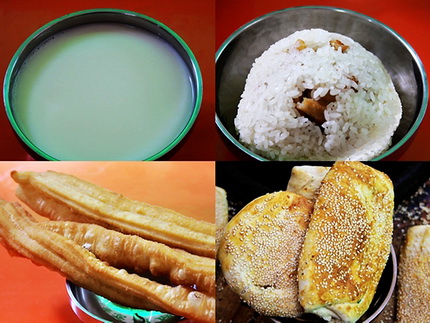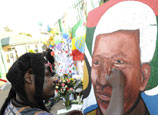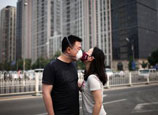
 |
| Four popular breakfast foods among Shanghai residents are known as the "four heavenly kings." They are (clockwise, from upper left) doujiang, or soybean milk; cifantuan, or steamed glutinous rice balls; dabing, or thin pancakes spread with sesame seeds, and youtiao, or deep-fried dough sticks.(Shanghai Daily) |
The city plans to open another 80 subsidized breakfast stores featuring local favorites prepared in a hygienically safe environment, many near big residential complexes, the Shanghai Commerce Commission said yesterday.
While most of the popular, standardized stores will be built downtown, plans call for more to be located in the near future in suburban areas, where the only service sometimes available is food carts that are more difficult for food safety supervisors to closely monitor. Some street vendors have been reported to use illegally recycled swill oil.
The city has more than 20,000 stores or street stalls selling breakfast, but only 5,000 are licensed, officials said. Many residents still buy food from unlicensed vendors on their way to work or school despite hygiene risks.
Operators of the standardized stores must apply to the city government and are granted incentives like subsidies and cheaper rents.
'Four heavenly kings'
The city now has about 1,165 standardized breakfast stores, which have proven popular. They sell traditional Shanghai breakfast food known as "four heavenly kings," or si da jin gang. They include youtiao (a deep-fried dough stick), dou jiang (soybean milk), cifantuan (a steamed, glutinous rice ball) and dabing (a thin pancake spread with sesame seeds).
Some famous brands such as Babi, known for steamed buns, and Gll Wonton, famous for dumplings, as well as some big sesame seed cake and noodle stores have either opened standardized breakfast stores or plan them, officials said.
Twenty years ago, there was at least one breakfast stall serving the traditional breakfast at the entrance to each longtang, a small alley with Shanghai's traditional shikumen-style (stone-gate) houses. But most are long gone, replaced in many cases by bakeries.
Ling Anqi, a local white-collar worker, said she used to buy breakfast from street vendors.
After a breakfast store opened in the Liangcheng area in Hongkou District where she lives, she bought food there.
"I prefer the traditional local breakfast over bread or cakes, but I am concerned about the hygiene and cooking materials of street vendors," she said.
















 A university graduate's shepherd career
A university graduate's shepherd career


![]()
